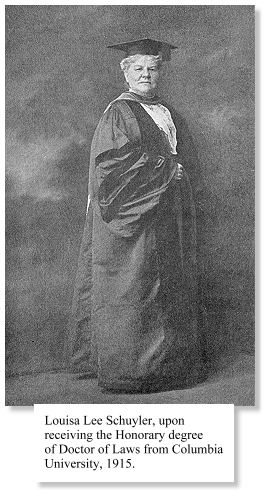


 |
 |
 |
 |
EARLY LIFE AND FAMILY It was understood by those that knew and worked with Grace Hoadley
Dodge in the years following
A deeply religious woman, Grace Dodge was the product of a generation of
middle to upper-class woman who were actively involved during the late
nineteenth and early twentieth centuries in social reform causes in cities
across the nation. Characterized as a having a "clear and practical
mind," but "no sense of humor whatever," Dodge dedicated her
entire life to urban social reform. Besides Teachers College and its antecedent
organizations, the Kitchen Garden Association and the Industrial Education
Association, Dodge was active, among other organizations, in the
Grace Dodge’s entry into the world of social reform and institution
building came naturally. Born in 1856 to Sarah Hoadley Tappan Dodge and
William Earl Dodge, Jr., Grace was reared in a family distinguished by
its great wealth and its involvement in Protestant evangelical causes and civic
affairs in New York City. Primary figures in the development of industrial
capitalism in the United States, the Dodges secured their fortune through the
establishment of what became the largest copper producing company in the United
States, Phelps, Dodge and Co. For the Dodges, evangelicalism, business and
entrepreneurship went hand in hand. From their point of view, wealth was a
God-given right meant to be used to further Christ’s work on earth. On the
basis of that belief system, the
Grace’s grandfather, William Earl Dodge, was nicknamed the "Christian merchant" for having contributed "to every free evangelical church to every religious and benevolent movement started in New York City between the years 1830 to 1880." Following in his father’s footsteps, William Earl Dodge, Jr. was a strong supporter, among other New York institution’s, of the YMCA, the Metropolitan Museum of Art, the Evangelical Alliance, the New York Children’s Aid Society, American Natural History Museum, the Union Theological Seminary and the American Sunday School Union, as well as, Teachers College. By virtue of both her mother and her father’s dedication to civic and
religious service, Grace Dodge, who was the eldest of six children, was
introduced to the principles and practices of social reform at an early age.
Located in the fashionable area of 39th Street and
Undoubtedly, the experience of meeting prominent religious and social
leaders made a lasting impression on Grace, influencing her decision to reject
a far more private and less demanding lifestyle, typical of a woman of her
social standing, in favor of a life directed toward reform activism. It was
following her return from Miss Porter’s School for Girls in Farmington,
Connecticut, where she studied between 1872 and 1874 that Grace became
involved, as noted in her "Record Book," in a number of reform
organizations and associations in New York City.
Until her death in 1914, Grace Dodge was a guiding spirit for Teachers
College. Much to her credit, she ensured the financial solvency of Teachers
College, enabling it to expand and grow on the basis of her own generosity and
her tireless efforts to raise money. Beginning with the appointment of Grace's
nephew,
 |
| MilbankWeb | EDUCAT | CLIO Plus | TC & CU
Webs | Email General Information | Collections & Services | Research Resources | Exhibits & Publications Questions | Search | Index |
|
| © 1999 Milbank Memorial Library. |